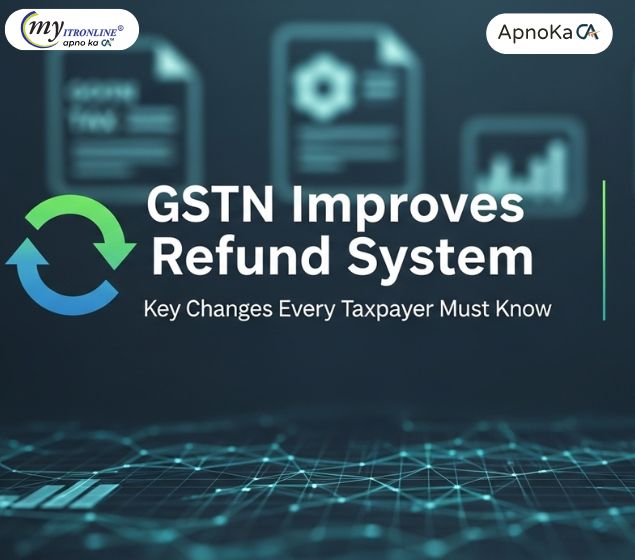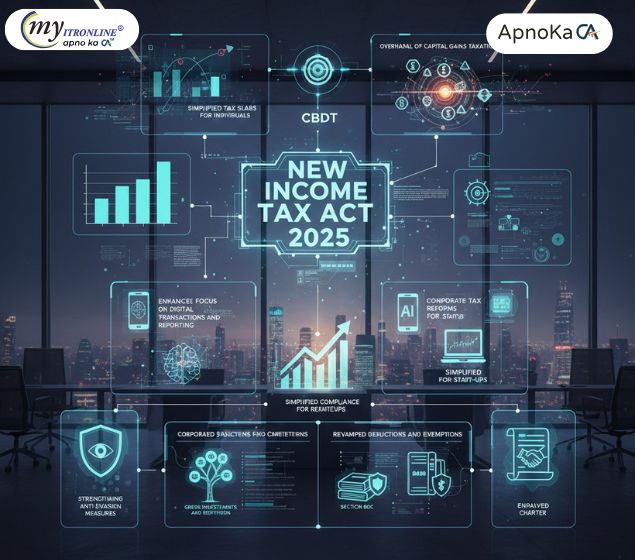# apnokaca
12 posts in `apnokaca` tag

Before You Click That Tax Notice: Read This Security Alert.
This blog provides a simple guide to help taxpayers differentiate between genuine and fraudulent income tax notices. It outlines five key verification steps, such as checking the DIN and sender details, to prevent falling victim to financial scams.

CBDT Circular 9/2025: No More 20% TDS Trouble in Property Deals
This blog post explains CBDT Circular No. 9/2025, which clarifies that the higher 20% TDS rate under Section 206AB will not apply to property transactions covered by Section 194-IA. This brings significant relief to buyers and sellers by ensuring a consistent 1% TDS deduction on property sales over ₹50 Lakhs, simplifying compliance and streamlining real estate dealings.

Taxpayers Alert: Major Updates in GST Refund Rules
The Goods and Services Tax Network (GSTN) has significantly revamped its refund system, introducing a unified application form (RFD-01), enhanced document uploads, real-time tracking, and integration with PFMS for faster disbursements. This blog details these crucial updates, explaining how they streamline the refund process for taxpayers, promote transparency, and minimize delays, ensuring timely receipt of their legitimate refunds.

Indian Multiplexes Urge Government for GST Rationalisation on Tickets and F&B
Indian multiplex chains are lobbying the government for a reduction in GST on movie tickets and the allowance of input tax credit (ITC) on food and beverages. They argue these reforms are crucial for making cinema more affordable, boosting industry growth post-pandemic, and competing with OTT platforms. While the Multiplex Association of India proposes a new tiered GST structure, industry opinions vary on whether pricing or content quality is the ultimate driver for audience footfall.

States Push for Tough Steps to Stop Profiteering from GST Cuts
The GST Council is set to meet on September 3-4 to review GST 2.0 reforms. States want strict rules to prevent profiteering so that GST rate cuts actually benefit consumers. Key proposals include a temporary anti-profiteering law, consumer complaint platforms, and tighter monitoring of sensitive sectors. Businesses, however, warn about compliance costs and pricing disruptions.

New Income Tax Act 2025: Key Updates from the CBDT
The Central Board of Direct Taxes (CBDT) has announced a significant overhaul of the Income Tax Act, effective from assessment year 2025-26. This blog details the crucial changes, including simplified individual tax slabs, revised capital gains taxation, a stronger focus on digital transactions, corporate tax reforms, revamped deductions and exemptions, enhanced anti-evasion measures, and the introduction of a Taxpayer Charter. Understanding these updates is vital for both individuals and corporations to ensure compliance and optimize financial planning under the new regime.
.jpg)
A Gift That Keeps on Taxing? ITAT Delivers Key Ruling on Capital Gains Between Spouses
The Income Tax Appellate Tribunal (ITAT) has clarified that when an asset gifted to a spouse is sold, the resulting capital gains must be taxed in the hands of the gifting spouse, not the recipient. This blog breaks down the mandatory "clubbing of income" provision under Section 64(1)(iv) of the Income Tax Act, explaining its implications for taxpayers, the calculation of gains, and the importance of proper documentation.
.jpg)
CBDT Instruction No. 01/2025 – Black Money Act Update for Minor Foreign Assets
The CBDT has issued Instruction No. 01/2025 on 18 August 2025, aligning its policy with the Finance (No. 2) Act, 2024. This update ensures that prosecution under Sections 49 and 50 of the Black Money Act will not be initiated for undisclosed non-immovable foreign assets valued up to ₹20 lakh. The move offers relief to genuine taxpayers, prevents harsh action for minor errors, and focuses enforcement on serious non-compliance cases.
.jpg)
How NRI Dividend Is Taxed in 2025: Rates, TDS, and Tax Planning
In 2025, NRIs receiving dividend income from Indian companies face a flat 20% tax plus surcharge and cess, deducted at source. With the abolition of Dividend Distribution Tax (DDT), the tax burden now lies with investors. However, NRIs can lower this liability using DTAA benefits, proper documentation, and strategic tax planning. This blog breaks down dividend tax rules, TDS rates, refund claims, and smart investment strategies to help NRIs make the most of their India growth story.
.jpg)
ITAT Cancels Tax Addition on Demonetization Cash Deposits
This blog post provides a detailed analysis of a significant Income Tax Appellate Tribunal (ITAT) ruling that cancelled a ₹10.46 lakh tax addition against a senior citizen. The case involves a large cash deposit made during the 2016 demonetization period, which the Assessing Officer had treated as unexplained money under Section 69A. The article explains the taxpayer's defense—that the cash was an accumulation of prior bank withdrawals—and breaks down the ITAT's reasoning, which centered on the "preponderance of probabilities" and the lack of contrary evidence from the revenue. The post highlights key takeaways for taxpayers, emphasizing the importance of plausible explanations and proper documentation.
.jpg)
The 1,50,000 Mistake: Why Filing Under 44AD Instead of 44ADA Could Wreck Your Finances
This blog post addresses a common but serious error made by professionals and freelancers who incorrectly file their income tax returns under Section 44AD (for businesses) instead of the appropriate Section 44ADA (for professionals). It explains the fundamental differences between the two sections, how the Income Tax Department's AI systems detect this discrepancy through TDS mismatches and unusually low-profit declarations, and the severe consequences that follow, including mandatory audits and multiple financial penalties. The article concludes by offering a clear, step-by-step guide on what to do if you receive a notice for this mistake, emphasizing the importance of consulting a professional and taking prompt corrective action.
.jpg)
Goodbye 1961, Hello 2025: India's New Income Tax Act Explained in Simple Terms
This blog post details India's landmark decision to replace the sixty-year-old Income-tax Act, 1961, with the new, simplified Income-tax Act, 2025, which will be effective from April 1, 2026. It breaks down the key changes in simple terms, explaining the reduction in legal complexity, the introduction of a unified "Tax Year," clearer definitions for digital assets, and the move towards faceless, technology-driven tax processes. The post highlights how these changes aim to create a more transparent, efficient, and taxpayer-friendly direct tax system for individuals and businesses across the country.
